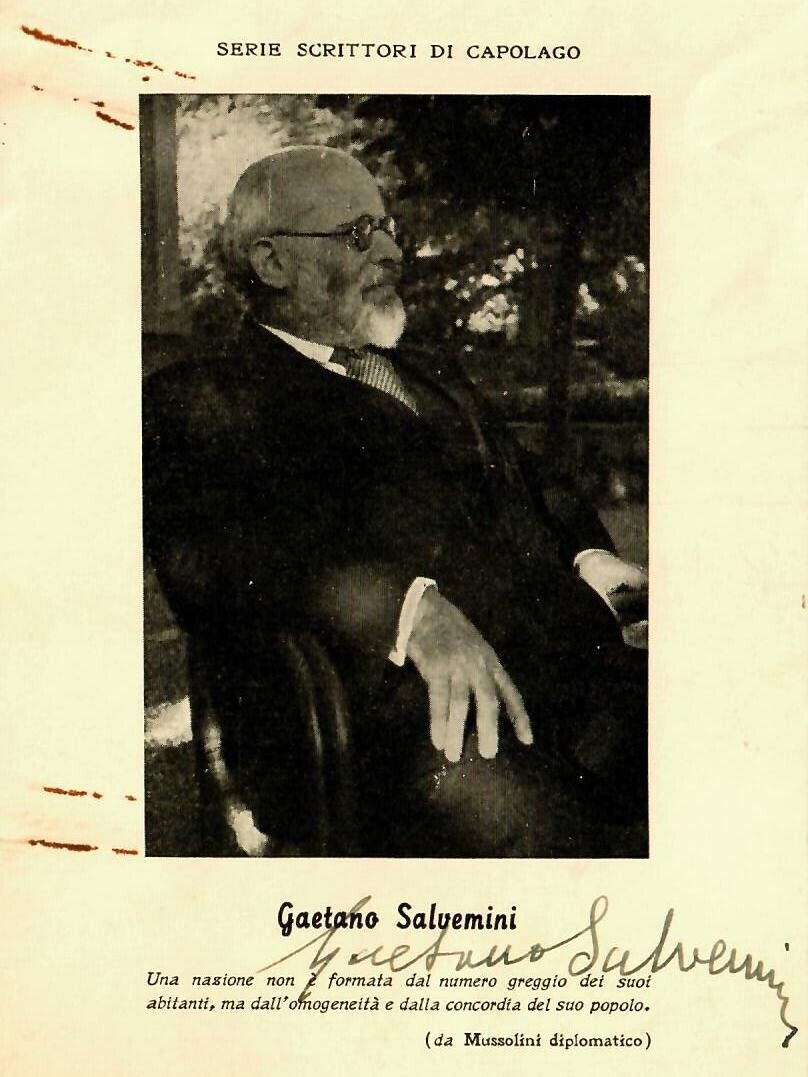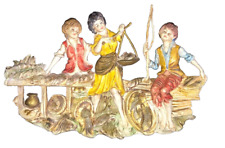

|
Site Categories |

|
Featured Items |

Poodle, Spaghetti Trim, Ucagco


|
RARE \"Italian Exiled Politician\" Gaetano Salvemini Signed Picture Postcard For Sale


When you click on links to various merchants on this site and make a purchase, this can result in this site earning a commission. Affiliate programs and affiliations include, but are not limited to, the eBay Partner Network.

RARE \"Italian Exiled Politician\" Gaetano Salvemini Signed Picture Postcard:
$999.99
Up for sale a VERY RARE!\"Italian Exiled Politician\" Gaetano Salvemini Hand Signed Picture Postcard.This item is authenticatedby Todd Mueller Autographs and comes with their certificate of authenticity. ES-844A Gaetano Salvemini:[ɡaeˈtaːno salˈvɛːmini]; 8 September 1873 – 6 September 1957)was an Italiananti-fascistpolitician,historian and writer. Born in a family of modest means, he became an acclaimedhistorian both in Italy and abroad, in particular in the United States, afterhe was forced into exile byMussolini\'sFascistregime. Initially engaging with theItalian Socialist Party,he later adhered to an independent humanitarian socialism, while maintaining acommitment to radical political and social reform throughout his life.Salvemini offered significant leadership to political refugees in the UnitedStates. His prolific writings shaped the attitudes of U.S. policymakers duringand after theSecond World War. Histransatlantic exile experience endowed him with new insights and a freshperspective to explain the rise offascism, while shaping the memory of the war and politicallife in Italy after 1945. He advocated a third way betweenCommunistsandChristian Democracyforpost-war Italy. Salvemini was born in the town ofMolfetta, inApuliain the poor south of Italy, in an extended familyof farmers and fishermen of modest means. His father, Ilarione Salvemini, wasacarabiniereand part-timeteacher. He had been a radical republican who had fought as aRed ShirtfollowingGiuseppe Garibaldiinhis fight forItalian unification. Hismother Emanuela (née Turtur) was a socialist. His parents\' political leaningsas well as the poverty of the region, shaped his own political and socialideals throughout his life. Hewas admitted at theUniversity of Florence,where he met mostly students of northern Italy and engaged with youngsocialists who introduced him toMarxism(which he would revise critically later), theideas ofCarlo Cattaneoandthe Italian socialistFilippo Turati\'s journalCritica Sociale, as well as his first wife MariaMinervini.After completing his studies inFlorencein 1894, his historical studies on medievalFlorence, theFrench RevolutionandGiuseppe Mazziniestablished him as an acclaimedhistorian.In1901, after years of teaching in secondary schools, he was appointed as aprofessor in medieval and modern history at theUniversity of Messina.While inMessina, he lost his wife, five children and his sister in thedevastating1908 Messina earthquakebeforehis eyes, while hiding under an architrave of a window; an experience thatshaped his life. \"I am a miserable wretch, without home or hearth, who hasseen the happiness of eleven years destroyed in two minutes,\" he wrote.He went on to teach history at theUniversity of Pisaandin 1916 was appointed Professor of Modern History at theUniversity of Florence.Overthe years, he aligned withLuigi Einaudiand gradually developed a pragmatic inquiryand inductive analysis, which he calledconcretismo– acombination of secular values from theenlightenment, liberalismand socialism – in contrast to more philosophical thinkers likeBenedetto CroceandAntonio Gramsci. Salvemini became increasingly concerned withItalian politics and adhered to theItalian Socialist Party(Italian:Partito SocialistaItaliano, PSI). In 1910, he published an article in thesocialist newspaperAvanti!entitled \'The minister ofthe underworld\' (Il ministro della malavita), in which he attacked thepower system and political machine of the liberal Prime MinisterGiovanni Giolittiwho dominated Italian political lifefrom the start of the 20th century.Salvemini reproached Giolitti toexploit the backwardness of Southern Italy for short-term political goals,appeasing the landlords while engaging with corrupt political go-betweens withties to the underworld.According to Salvemini, Giolittiexploited \"the miserable conditions of theMezzogiornoinorder to link the mass of southern deputies to himself\".He opposed thecostly military campaign in Libya duringItalo-Turkish War(1911–1912). The war did not meet thereal needs of the country in need of far-reaching economic and social reforms,according to Salvemini, but was a dangerous collusion between unrealisticnationalism and corporate interests.In 1911, Salvemini left the PSIbecause of the \"silence and indifference\" on the war by the partyandfounded the weekly political reviewL\'Unitàthat would serveas the voice of militant democrats in Italy for the next decade. He criticisedthe government\'simperial designs in Africaaschauvinist foolishness.However,he did favour Italy\'s entry in theFirst World Waron the side of theEntente,in order to achieve a greaterpolitical, economic and social stake in the nation by the masses, as wellasnationalself-determination.He became one of the leaders of thedemocratic interventionists withLeonida Bissolati. Through the fight for democracy abroad, hebelieved, Italy would rediscover its own democratic roots. Consistent with hisinterventionist position he joined as a volunteer in the first two years of thewar.As a member of the PSI he fought foruniversal suffrage, forthe moral and economic rebirth of Italy\'s Mezzogiorno (Southern Italy) and against corruption in politics. As ameriodanalisthecriticised the PSI for its indifference for the problems of the South of Italy.While he abandoned the Socialist Party to adhere to an independent humanitariansocialism, he would maintain a commitment to radical reform throughout hislife.Elected on a list of ex-combatants, he served in theItalian Chamber ofDeputiesas an independent radical from 1919 to 1921 during therevolutionary period of theBiennio Rosso.He supported theinternationalist programme of self-determinationof theU.S. presidentWoodrow Wilson, whichenvisioned a re-adjustment of the frontiers of Italy along clearly recognizablelines of nationality, in contrast to theirrendentistpolicyof Foreign MinisterSidney Sonnino. In theimmediate post-war period, Salvemini was initially silent aboutItalian Fascism,but as a deputy he soon dissentedfrom the political line of its parliamentary group and started a lively polemicagainstBenito Mussolini, who hehad admired in the past as socialist leader, to the point that Mussolini even challengedhim to a duel, which never took place. Nevertheless, as late as 1922, heconsidered the fascist movement too small to be a serious political challenge.Salveminiwas more opposed to old-style politicians like Giolitti. \"A return toGiolitti would be a moral disaster for the whole country,\" he wrote.\"Mussolini was able to carry out his coup ... because everybody wasdisgusted by the Chamber.\" While in Paris he was surprised byMussolini\'sMarch on RomeinOctober 1922, which initiated the Fascist take over of Italy.In 1923, he held a series oflectures on Italian foreign policy in London, to the ire of the Fascistgovernment and Florentine fascists. The walls of Florence were plastered withposters saying: \"The monkey from Molfetta should not return toItaly\". Instead, Salvemini not only returned home, but resumed hislectures at the University, regardless of the threat of fascist students. Hejoined the opposition after the murder of the socialist politicianGiacomo Matteottion 10 June 1924, when it became clearthat Mussolini wanted to establish a one-party dictatorship.Heworked to maintain a strong network of contacts among anti-fascistintellectuals throughout Italy, while much of the Italian academic world bowedto the regime.With his former students and followersErnesto RossiandCarlo Rossellihe founded the first clandestineanti-fascist newspaperNon mollare(Don\'tGive Up) in January 1925.A half year later he was arrested and put ontrial,but was released on a technicality, although he was kept undersurveillance.Threats against his life were published in the Fascist pressand his lawyer was beaten to death by Fascist blackshirts. His name was on topof the list of the Fascist death squads during raids on 4 October 1925 inFlorence. However, Salvemini had fled to France in August 1925. He wasdismissed from the University of Florence and his Italian citizenship wasrevoked in 1926. In exile Salvemini continued to actively organize resistanceagainst Mussolini in France, England and finally in the United States. In 1927,he publishedThe Fascist Dictatorship in Italy, a lucid andgroundbreaking study of the rise of Fascism and Mussolini.In Paris he was involved with thefounding ofConcentrazione antifascistain 1927 andGiustizia e LibertàwithCarlo andNello Rosselliin1929. Through these organizations, Italian exiles were helping theanti-fascists in Italy, spreading clandestine newspapers. The movement intendedto be a third alternative between fascism and communism, pursuing a free,democratic republic based on social justice.

|
|
Related Items:
Rare Sorini Pietro & Casi Ilario Arrezo Italian 800 Silver Miniature LAYING LION $245.00

Rare Vintage Italian 3D Figural Art Wall Plaque 3 People Fishing Village $99.99

RARE Italian Plastic Pug Dog Mannequin $129.95
|
|


|
Shopping Cart  |

|
Recently Viewed |

|
Latest Items |

|
Facebook |
Secure Websites

|








